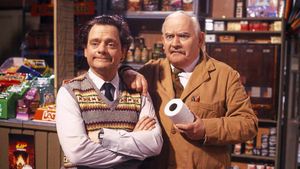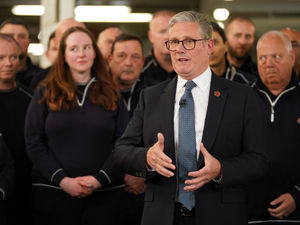Cornered shops: Is Tesco becoming too powerful? Vote in our poll
In his 12 years as an independent Shropshire shopkeeper, David Smith has grown to cherish the freedom of being his own boss.
Like Arkwright in Open All Hours, there is great pride to be had in serving a community with their needs.
And the likes of Tesco have traditionally been seen as the big enemy, chipping away at the tradition of the British corner shop.
The irony isn't lost on the likes of Mr Smith, then, that the cash-and-carry used by many of small traders to fill their shelves has been taken over – by Tesco.
"Being a shopkeeper is always difficult, there are always challenges, but I enjoy it, it's always interesting," said Mr Smith, who keeps the Nix Convenience Store near Newport, on the Shropshire-Staffordshire border.
"Before that I worked as a bank manager, and I saw a lot of big companies telling people what to do, but here I am my own boss."
Like thousands of small retailers up and down the country, Mr Smith is now waiting to see what the ramifications will be from the actions of Tesco.
The all-conquering retail colossus seen by many as the nemesis of the small retailer, will soon be supplying his stock if a proposed takeover goes ahead.
Tesco, the UK's biggest retailer, has announced a £3.7 billion takeover of Britain's biggest wholesaler, the Booker Group, which has cash-and-carry warehouses in Shrewsbury, Telford, Wolverhampton and Dudley, as well as the Makro store in Halesowen.
Booker supplies 120,000 independent shops around the country, as well as 450,000 caterers including chains such as Wagamama, Carluccio's and Byron, as well as celebrity chef Rick Stein.
Mindful of the impact that Tesco has had on the filling station trade, Mr Smith sounds a cautious note.
"It will be interesting to see how it affects the independents," he says.

"It's going to have some advantages, we will get some better deals, I'm told there will be some incentives, but Tesco has always been the sworn enemy.
"You could say I'm ambivalent about it, but it is something I am powerless to affect anyway."
Like the fictional Arkwright, Mr Smith is a non-tied retailer. That means he is free to shop around with other wholesalers if he cannot find the deals that he wants, although any changes to the country's dominant wholesaler is bound to have a knock-on effect across the industry.
But there is another group of retailers who will be taking an extra-keen interest in how the deal takes shape.
Since 2015, Booker has also owned the Londis, Budgens and Premier "symbol" groups, which account for 5,500 independent grocers around the UK. Under the arrangement, the stores benefit from preferential supply deals and are jointly marketed under a single brand, and in return for these benefits they are expected to purchase a certain proportion of their stock from the symbol group, and to comply with certain rules.
Syed Sharma is area manager for a small chain of Premier stores, including ones in Pennfields, Wolverhampton, and another in Stourbridge.
"I don't think it will make a lot of difference, as long as the pricing is competitive," he says. "It will, of course, mean that Tesco has the monopoly, though."
David Knight, who has kept the Londis store in Cheshire Street, Market Drayton, for the past 25 years, does not expect to see many changes.
"I don't think it will make any difference whatsoever," he says.
"You might see one or two of the product lines change a bit, and one or two of the deals being a little different, but in my experience it doesn't make any difference whatsoever."
Mr Knight has seen plenty of takeovers and mergers since he first took on his shop.
Londis, originally an acronym for London District Stores, was founded in 1959 by Kevin Stanley-Adams along the lines of a co-operative for the benefit of independent retailers trading in and around the capital. The main aim was that by pooling resources, the small traders would be able to compete with the emerging supermarkets when it came to bulk purchasing and marketing costs. It remained that way until 2004, when it was taken over by the Irish Musgrave Group, which paid each franchise holder £31,000 for their holdings. The takeover bought Londis under the same umbrella as rival Budgens, which had begun life in 1872 as a small chain of grocery shops in the south of England, but which saw rapid expansion during the second half of the 20th century.
Then, in 2015, both chains were taken over by the Booker wholesale group, which also owns Premier Stores, so it is perhaps not too surprising that retailers are adopting something of a wait-and-see approach.
While the aggressive expansion of Tesco in the convenience store sector has led to fierce protests in other parts of the country, Mr Sunner says he is not worried about the company some see as something of a predator taking control of his supply chain.
"I am not tied to them," he says. "There's a lot of options out there."
The deal will bring together Britain's biggest grocery retailer and the country's biggest food and drink supplier in a deal worth £3.7 billion.
Tesco will pay 205.3p per Booker share, meaning that each Booker shareholder will receive 0.861 Tesco shares and 42.6p in cash. Booker shareholders will own around 16 per cent of the combined business.
Tesco says the agreement will create "the UK's leading food business" and deliver significant efficiency savings for the combined group.
But while Mr Knight and Mr Smith are not too concerned about the deal, others are less happy.
Adam Hogwood, who keeps a Londis store in Broadstairs, Kent, says there is a "bittersweet feeling" about the takeover.
"A lot of us have seen Tesco as the competition and it's very personal," he says.
"On the other hand, the buying power's going to increase and hopefully that'll filter down to us at store level."
Tesco, like rivals Sainsbury's and Morrisons, has expanded aggressively into the convenience store market in recent years, often at the expense of the stores which are now supplied by Booker. In Shifnal for example, where there was not so long ago a Family Shopper branch, its place has now been taken by a One Stop Tesco.
Tesco now has 2,500 stores operating under its Tesco Express and One Stop banners, and clearly the takeover is another attempt to increase its exposure to this market.
Booker Group chief executive Charles Wilson insists the deal with not see independent retailers turn into Tesco clones.
"Are we going to be turning Booker retailers into mini Tescos? Not a chance," he says. "Independent retailers know what they want and what they need, it's our job to earn their business and to serve them."
Mr Wilson says the deal will deliver better service, choice and competitive prices for its retailers, and said product quality would also increase – particularly on fruit and vegetables, where the independents will be able to "plug" into Tesco's supply chain.
Tesco, which has seen something of a recovery since chief executive Dave Lewis took the helm in 2014, claims the takeover will result in £175 million worth of savings within three years, more than half of which will come from the super-chain's enhanced purchasing power.
However, a fly in the ointment could come in the form of the Competition and Markets Authority (CMA), which spent eight months investigating the much smaller 2015 takeover of discount retailers 99p Stores by Black Country based Poundland.
Mr Lewis and Mr Wilson have played down the prospect of the deal being held up by the CMA, but former Marks & Spencer chief Lord Rose does not think Tesco will get off that lightly. "The CMA will be all over it like a rash, and they should be," he says.



